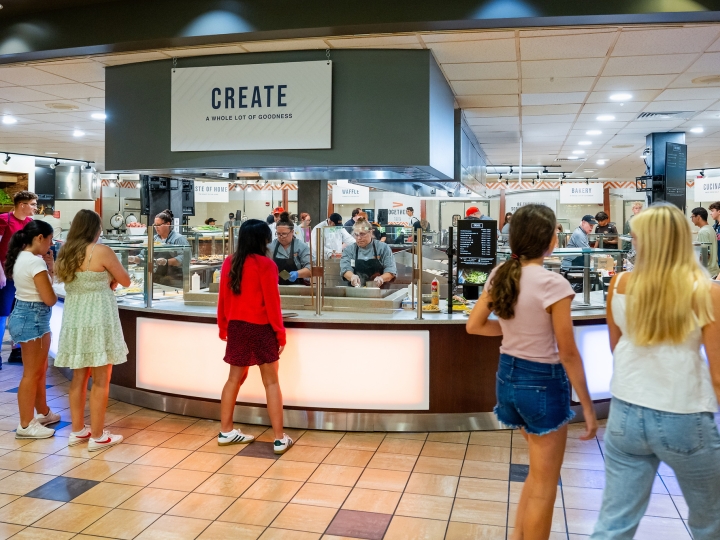
The Humanist Factor
July 18, 2016
Comparative Humanities students, from left, Tong Tong ’17 and Elaine Lac ’16 chat with Professor James Mark Shields. Brett Simpson, Division of Communications
"The arts and humanities define who we are as a people. That is their power — to remind us of what we each have to offer and what we all have in common."
These words from First Lady Michelle Obama illuminate why a group of humanities faculty has been working to strengthen and reaffirm the critical role of the liberal arts at Bucknell. The work has resulted this month in the launch of a new Humanities Center committed to spotlighting the continued importance of the humanities on campus and beyond.
"The humanities aren't the entirety of the liberal arts, but they're certainly a core component and something we need to make sure do not disappear," says Professor James Mark Shields, comparative humanities and Asian thought, the center's inaugural director.
Ann Tlusty, associate dean of faculty for the College of Arts & Sciences and an early advocate for creating a Humanities Center, agrees. "We're about supporting the mission and the ideas of the entire campus from the point of view that you can't do all these other things if you leave humanity out of it."
The center is the result of two years of informal discussion that eventually brought together representatives from each of Bucknell's 10 humanities departments, Library & Information Technology and Bucknell University Press to form a Humanities Council. President John Bravman and the Board of Trustees approved a proposal for a dedicated space for the center last fall, with a launch date of July 1. Demosthenian Hall, once home to Delta Upsilon fraternity, will be refurbished by early 2018 and reopened as the physical locus of the center's activities.
According to Shields and Tlusty, the center has several key aims:
- To support humanities faculty in their teaching and research, including interdisciplinary collaboration
- To give humanities students a place to gather to collaborate or work on their own projects
- To help fund materials and facilities to enhance learning and award small grants that support faculty and student research.
- To showcase the humanities to students in all areas of study and to the general public
Starting next year, a faculty committee will name a faculty fellow annually to coordinate yearlong thematic programming. More immediately, Greg Clingham, John P. Crozer Professor of English and director of Bucknell University Press, has lined up four visiting scholars to address the 2016-17 theme, "The Book: Past, Present, Future," in a series of public events.
"I think the Humanities Center needs to be a mode of outreach, a bit the way the Weis Center for the Performing Arts is today," Clingham says.
Students, too, have played a key role in the center's development, from producing a student-run journal of criticism to weighing in on the center's design.
"There is something so perfect about that building," says Tlusty of the center's future site. "It's a traditional-looking building, it faces the humanities quad and what will be a new entrance to the library. I like the idea of bringing students together who might be in history or religious studies or philosophy and having them relate to one another. I think we can build a real identity and a sense of excitement around the humanities."
Shields agrees: "We have a real opportunity here to make a mark on Bucknell and to create something that is going to have a lasting effect."
